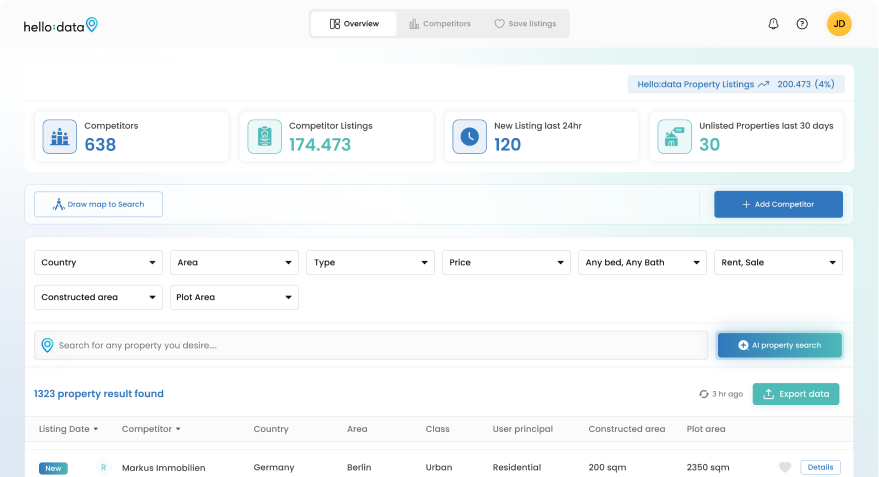The Role of Economic Base in Real Estate Investments
Understanding the economic base is crucial for real estate investments. The term economic base refers to the economic foundation of a region, which drives its financial stability and growth. For investors, recognizing this foundation is essential for making informed property investment decisions.
What does economic base mean in real estate?
In real estate, the economic base of a region consists of the industries and sectors that bring income into the area. These sectors can be divided into:
- Basic sectors: Industries that export goods or services outside the region, bringing external income.
- Non-basic sectors: Local businesses and services that circulate money within the region.
Key takeaway: Understanding the economic foundation of a region is crucial for making informed property investment choices. This knowledge helps investors predict market trends, assess risks, and identify opportunities.
Investing in regions with a strong economic base typically leads to:
- Higher demand for residential and commercial properties
- Increased employment opportunities
- Population growth
- Long-term property value appreciation
Incorporating economic base analysis into investment strategies empowers investors to make smarter decisions. The direct correlation between a robust economic foundation and real estate success cannot be overstated.
Understanding As Stabilized Value in Real Estate Investments
An important aspect of real estate investments that ties into understanding the economic base is grasping the concept of as stabilized value. This term refers to the estimated value of a property once it has reached its optimal operational state. A strong economic base can significantly influence this value, leading to more profitable investment outcomes.
Leveraging AI for Property Search
Moreover, with advancements in technology, particularly in AI, the landscape of property search has evolved dramatically. AI property search tools are revolutionizing how renters and landlords navigate the real estate market. These advanced technologies not only streamline the property search process but also provide investors with valuable insights into market trends through sentiment analysis.
In conclusion, understanding the economic base of a region is paramount for successful real estate investments. Coupling this knowledge with advanced AI tools can further enhance decision-making processes, leading to better investment outcomes.
Understanding Economic Base in Real Estate
To define the economic base in real estate, we must first understand its core components. The economic base of a region refers to the primary industries and businesses that drive the local economy. These foundational elements generate income and employment, which in turn, influence the demand for real estate.
Basic Sector
This sector includes industries that bring income into the region from external sources. Examples relevant to property markets include:
- Manufacturing Plants: Large factories that produce goods for export.
- Tourism: Resorts or attractions drawing visitors from outside the area.
- Technology Hubs: Companies developing software or hardware for global markets.
With the rise of Artificial Intelligence in Real Estate, technology hubs are becoming increasingly significant in the basic sector. These advancements are not only transforming every aspect of the buying, selling, and management process but also influencing property values and demand.
Non-Basic Sector
This sector consists of businesses that primarily serve the local population. While not directly bringing external income, they support the community’s needs. Examples include:
- Retail Stores: Local shops catering to residents’ daily needs.
- Healthcare Services: Hospitals and clinics serving local patients.
- Educational Institutions: Schools and colleges educating the local populace.
Understanding these distinctions is vital for real estate investors. A robust basic sector typically leads to higher job creation, attracting more residents and boosting demand for housing and commercial properties. Conversely, a strong non-basic sector supports community stability, enhancing long-term property value retention.
Recognizing the interplay between these sectors enables smarter investment choices, aligning property acquisitions with regions poised for growth due to their economic foundations. For instance, understanding metrics like breakeven occupancy can provide valuable insights into property performance.
Moreover, with the advent of PropTech—short for Property Technology—the way we buy, sell, and manage real estate is undergoing a significant transformation. This innovative technology is revolutionizing every aspect of the property market.
In this evolving landscape, platforms like ClickPay are simplifying financial transactions in real estate. This cloud-based solution streamlines the complicated process of collecting rent and managing finances.
Lastly, with innovative AI property search technologies like Hello Here, finding suitable properties has become more efficient and user-friendly than ever before.
Impact of Economic Base on Real Estate Demand and Property Values
A strong economic base drives demand for residential and commercial properties. Key industries and employers provide job opportunities, attracting workers who need housing and commercial space. This demand, in turn, leads to increased property values and rental rates. Conversely, regions with weak economic foundations may experience stagnation or decline in real estate markets.
By considering economic indicators such as job growth, industry diversification, and income levels, investors can identify areas with potential for long-term property value appreciation. This strategic approach maximizes returns and reduces the risk of investing in volatile markets. services. As employment grows, so does the demand for real estate.
Correlation between employment opportunities, population growth, and housing demand:
- Employment Opportunities: Areas with a high concentration of jobs in sectors like technology, finance, or healthcare tend to see increased population growth. For instance, cities like San Francisco and Austin have experienced property booms due to their thriving tech industries.
- Population Growth: More people moving to a region creates a need for more housing. This boosts not only the residential market but also the commercial real estate sector as new businesses open to serve the growing population.
Relationship between a robust economic base and property value appreciation over time:
- Property Appreciation: Properties in regions with strong economic bases tend to appreciate over time. Continuous demand driven by job availability ensures that property values remain stable or increase. Take New York City as an example; its diverse economic foundation has consistently supported high property values.
- Top Property Management Company Insights: Leading property management firms often prioritize investments in areas with a solid economic base. They understand that such regions provide stable returns due to ongoing demand for both residential and commercial spaces.
Understanding these dynamics is crucial for making informed real estate investment decisions. A strong economic base not only ensures consistent demand but also supports long-term property appreciation.
In this context, leveraging technology can further enhance the real estate experience. For instance, AI property search systems are revolutionizing how properties are searched and managed by making these processes easier and more efficient. Additionally, market segmentation strategies are helping in tailoring real estate offerings to meet specific consumer needs better.
For sellers looking to maximize their returns without incurring heavy costs, exploring options like the cheapest way to sell a house could prove beneficial. Moreover, the use of real estate data analytics is providing professionals with valuable insights that aid in making informed decisions.
Lastly, understanding statistical tools such as regression analysis can help in comprehending the relationship between various factors influencing the real estate market, thereby guiding investment strategies and risk assessment.
In summary, while a strong economic base forms the foundation for stable real estate investments, leveraging technology, market segmentation, cost-effective selling options, data analytics, and statistical tools can further enhance the overall real estate experience and lead to more informed decision-making.prehending the relationships between various variables in real estate, further aiding investment decisions.
Investment Decisions Driven by Economic Base Analysis
Understanding the economic base is a game-changer for real estate investment. By analyzing the economic foundation of a region, investors can identify lucrative investment opportunities and make informed decisions.
Key indicators to consider:
- Employment Trends: A growing job market signals economic stability. More jobs mean more people moving to an area, driving demand for both residential and commercial properties.
- Location Quotient (LQ): This metric measures the concentration of industries in a region compared to a larger reference area. A high LQ in specific sectors indicates regional economic strengths, guiding targeted investments.
Investors must keep an eye on these indicators to stay ahead. Understanding economic changes helps predict property value trends and potential returns. By focusing on the economic base, investors unlock insights that standard market analysis might miss.
Additionally, leveraging technology such as AI can further enhance investment strategies. For instance, platforms like Hello:Here are revolutionizing property searches by using AI-driven solutions that offer unprecedented efficiency and accuracy. These advancements not only streamline the property search process but also provide valuable data on effective rents through their innovative approach as detailed in this article about Hello:Here and effective rents.
Moreover, understanding the concept of an Automated Valuation Model can also provide investors with significant advantages in property valuation, enabling them to make more informed decisions based on precise data.
Urban Planning Considerations in Relation to Economic Base
Urban planning relies heavily on economic base analysis. Understanding the economic strengths and weaknesses of a region helps inform decisions related to infrastructure development, zoning regulations, and the allocation of resources. For example, a region with a strong manufacturing base might prioritize investments in industrial parks, while a region with a thriving service sector might focus on developing commercial hubs.
Furthermore, urban planners can leverage AI-powered tools to simulate the impact of different policies and interventions on the economic base. These simulations enable them to make more informed decisions that align with the long-term economic goals of the region.
In conclusion, an in-depth understanding of the economic base is crucial for investors and urban planners alike. By combining traditional economic analysis with innovative technologies like AI, stakeholders can uncover hidden opportunities and drive sustainable growth in their respective domains.erstanding the economic foundation of a region shapes infrastructure development strategies and resource allocation.
Role of Economic Base Analysis
Urban planners use economic base data to identify growth sectors, guiding decisions on zoning, transportation networks, and public services. This ensures that investment aligns with the region’s economic strengths and promotes long-term sustainability.
Simulating Policy Impacts
AI-powered simulations provide a valuable tool for urban planners to test different policies and interventions. This helps anticipate their impact on the economic base, enabling more informed decision-making. By understanding potential outcomes, stakeholders can devise strategies that maximize positive effects and minimize unintended consequences.
Unleashing Hidden Potential
AI can also uncover hidden opportunities within an economic base. By analyzing vast amounts of data, AI algorithms can identify emerging sectors or untapped markets. This knowledge can inform investment decisions, spurring innovation and diversification within the region.
Conclusion
In an increasingly complex and interconnected world, understanding the economic base is paramount. AI tools augment traditional analysis methods, providing insights that help shape sustainable development strategies. By harnessing the power of AI, stakeholders can navigate challenges, capitalize on opportunities, and foster resilient economies for generations to come.frastructure projects align with the economic strengths of the area.
Infrastructure Development
A strong economic base indicates robust employment opportunities and population growth. This drives demand for housing, schools, healthcare facilities, and commercial spaces. Planners prioritize these projects to support sustainable urban growth.
Economic base insights empower urban planners to create resilient cities. The alignment between economic conditions and planning efforts fosters thriving communities and enhances property values over time.
Moreover, understanding models like the Multiple Nuclei Model can further enhance urban planning strategies by providing insights into how urban areas develop around multiple centers or nuclei.
Hello:Here – Revolutionizing Real Estate through AI and Economic Insights
Hello Here SL is changing the real estate industry with its AI-driven real estate app. The platform uses advanced AI technology, such as Support Vector Machines, to provide better property searches, making the process more efficient and targeted.
More Data for Better Decisions
Hello Data stands out by gathering a wide range of real estate data, surpassing traditional platforms like Casafari and Idealista. With 82,000 properties in Mallorca alone compared to Idealista’s 24,000, Hello Data offers unmatched market insights. This comprehensive data collection helps investors make informed decisions based on local economic conditions.
AI-Powered Property Matches
The combination of AI and extensive data resources allows Hello:Here to deliver precise property matches tailored to individual needs. By understanding the economic base of regions, Hello:Here ensures that investments align with growth and value appreciation trends.
Maximizing Home Sales with Geospatial Analysis
The platform uses geospatial analysis techniques to maximize home sales in Spain. This innovative approach uses geographical data and mapping techniques to analyze properties and land effectively.
Tax Benefits for Investors in Opportunity Zones
Additionally, Hello:Here provides valuable insights into Opportunity Zones, designated areas where investors can receive significant tax incentives for investing in economically distressed regions.
Determining Property Value with Comparative Market Analysis
The platform also assists in conducting a Comparative Market Analysis, an essential tool that helps real estate investors determine the value of a property by analyzing data from recently sold properties with similar characteristics.
Discover how Hello Here SL can transform your property investment strategy by visiting Hello Here.









